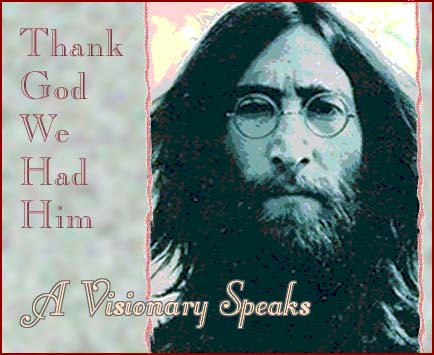
| Thank God We Had Him A Visionary Speaks For Himself About His Life and Times
Each year as October 9th rolls around, many thoughts come to my mind about John Lennon, but this year, the most prominent of these mental ramblings was this: an utter awareness of how lucky the world was to have had him among us. John was, to say the least, unique. His personality, his countenance and his talent came together to make him one in a million. And yet, we have to ask: what actually made this one human being stand out so brilliantly among the crowd? The answer is his spirit, his soul, his being. John was truly authentic. He seemed to have lived his life on the edge from the very start, and over the years this bare-bones realism carved him into the honest, intuitive, and gritty-yet-sensitive artist the world so willingly and lovingly came to know. As I pondered how best to honor John on what would have been his 61st birthday, I realized that perhaps I should let him speak for himself. And so, what follows is a brief exploration into what made John Lennon, John Lennon. In his own words (and the words of a friend who most likely knew him best).
“It was scary as a child, because there was nobody to relate to. Neither my auntie nor my friends nor anybody could ever see what I did. It was very, very scary and the only contact I had was reading about an Oscar Wilde or a Dylan Thomas or a van Gogh--all those books that my auntie had that talked about their suffering because of their visions. Because of what they saw, they were tortured by society for trying to express what they were. I saw loneliness. “Surrealism had a great effect on me, because then I realized that my imagery and my mind wasn’t insanity; that if it was insane, I belong in an exclusive club that sees the world in those terms. Surrealism to me is reality. Psychic vision to me is reality. Even as a child. When I looked at myself in the mirror when I was 12, 13, I literally used to trance out into alpha. I didn’t know what it was called then. I found out years later there’s a name for those conditions. But I would find myself seeing hallucinatory images of my face changing and becoming cosmic and complete. This thing gave me a chip on the shoulder; but, on the other hand, I wanted to be loved and accepted. Part of me would like to be accepted by all facets of society and not be this loudmouthed lunatic musician. But I cannot be what I am not.” Thank God for that. It was just this spark of spiritual vision that allowed John Lennon to share the unique gifts he possessed with his generation and the generations to come. In regard to John’s keenly gifted nature, there were some early clues, which would later be seen in hindsight by his family and friends. Close boyhood friend and confidante, Pete Shotton, had this to say about his mate: “John was an exceptionally cocky kid who demonstrated precious little respect for his elders and invariably said exactly what he thought. By the age of nine or ten, he had already honed his now legendary ‘rapier wit’ to the point that he could usually provide our parents--or anyone else--with a devastating rejoinder whenever they attempted to put him in his place. John was amusing virtually all the time. In my company, his humor was often deadpan in the extreme; he could make me laugh with just a word, a subtle inflection in his voice, or an almost imperceptible gesture. John instinctively gravitated toward the center of attention, and his powerful personality always guaranteed him a large and admiring audience. John was our resident comic and philosopher, outlaw and star. In retrospect, one might say that John, even as a child, viewed the world almost as a surrealistic carnival. Life, to him, was a never-ending stage play, and he would discover something bizarre in even the most mundane event. Whether an active participant or simply an observer, John would deliver a running commentary on his surroundings, his precociously caustic remarks underscored by an impish glint in his pale brown eyes.” Shades of what was to come, via Strawberry Fields Forever and other such psychedelic expressions from a Lennon by then well-supplied with hallucinogens, emerges from Shotton’s childhood memories. But, at the time, who knew? It seems John’s Aunt Mimi was the one who could least appreciate the early signs of John’s visionary artistic talent. As much as she loved him, she didn’t seem to understand him; but that did come from a few others who were in contact with the young John. At his junior school, when handing Mimi a bundle of John’s drawings, his teacher commented: “The perspective is amazing for a boy of eleven.” Yet, this didn’t stop Mimi from tossing out John’s preciously creative artwork. Of this period of his life, John said:
Troubling words from a still-troubled man; a misunderstood genius who beat the odds and changed the world. It appears that John never got over what he condemned as mistreatment during his childhood. And he never got over being abandoned by this mother and father. Of his mother’s death, John said: “She got killed after visiting my auntie’s house where I lived, by an off-duty cop who was drunk. A copper came to the door to tell us about the accident. Asking if I was her son and all that. Then he told us, and we both went white. It was the worst thing that ever happened to me. I thought, ‘I’ve no responsibilities to anyone now.’ I was sixteen. It was another big trauma for me. I lost her twice. That made me more bitter. I was in a sort of blind rage for two years. I was either drunk or fighting. There was something wrong with me. I cried a lot about not having parents and it was torture, but it also gave me an awareness early.” About his long-lost, seafaring father, John said: “I never saw him until I made a lot of money and he came back. I opened the Daily Express and there he was, washing dishes in a small hotel or something very near where I was living in the Stockbroker belt outside London. He had been writing to me to try to get in contact. I didn’t want to see him. I was too upset about what he’d done to me and to my mother, and that he would turn up when I was rich and famous and not bother turning up before. He sort of blackmailed me...I fell for it and saw him and we had some sort of relationship. He died a few years later of cancer.” Clearly, John’s subsequent rise to fame did little to assuage his deep inner pain. Despite the unparalleled freedom he had to express his creative genius to a global audience, and the accolades that accompanied it, the sound of his own music reverberating back to him was hollow. Of the stress and strain of fame and Beatlemania, John said: “The bigger we got, the more unreality we had to face. One has to completely humiliate oneself to be what The Beatles were, and that’s what I resent. I didn’t know; I didn’t foresee. It happened bit by bit, gradually until this complete craziness is surrounding you, and you’re doing exactly what you don’t want to do with people you can’t stand--the people you hated when you were ten. Fuckin’ big bastards, that’s what The Beatles were. You have to be a bastard to make it, that’s a fact, and The Beatles are the biggest bastards on earth. All the handouts, the bribery, the police, all the fucking hype. Everybody wanted in and some of them are still trying to cling to this. Don’t take it from us, otherwise you’re mad, John, you’re crazy. Silly John wants to take all this away.” And take it away he did. It was a struggle that went on for quite some time, but Beatle John did emerge into a new light as John Lennon, the elder statesman of rock and roll. He said in his cathartic song God : “I was the Walrus, but now I’m John.” Unfortunately, the world wasn’t ready, willing or able to let go of their hero, their spokesman, their all-knowing “answer man.” By the time The Beatles were finis, John was hooked on heroin and married to his avant-garde artist love, Yoko Ono. Of the continuing, oppressive idolization from the public, John said: “If The Beatles or the sixties had a message, it was to learn to swim. The people who are hung up on The Beatles and the sixties dream missed the whole point when The Beatles and the sixties dream became the point. To live in that dream is the twilight zone. It’s not living now. It’s an illusion. When I was a Beatle, I thought we were the best fucking group in the god-damned world. And believing that is what made us what we were.”
“I think I’ve graduated in a way: from Liverpool to London and from London to New York. I behave here as I have all my life, you know. I lead a quiet life, really. I don’t go out to eat more than once or twice a week. People recognize me, but they don’t trouble me too much. I don’t have any hankering to be looked upon as a sex object, a male, macho rock ‘n’ roll singer. I got over that a long time ago. I cancelled all the trade papers, I didn’t know what the hell was going on and I had no interest in it. I don’t want to have to sell my soul again, as it were, to have a hit record. I’ve discovered that I can live without it. Why were people angry at me for not working? You know, if I was dead, they wouldn’t be angry at me. If I had conveniently died in the mid-70s, they’d all be writing this worshipful stuff about what a great guy I was and all.” How right you were, John! But I won’t be persuaded by your words into not talking about you. I will, however finish up with some of what you had to say about something quite philosophical--your thoughts on life and death: “I used to worry a lot about death when I was a kid, now the fear of it means less and less to me. It seems as you get older, you worry less and less about death. I hope I die before Yoko, because if Yoko died, I wouldn’t know how to survive. I couldn’t carry on. We’re going to live, or we’re going to die. If we’re dead, we’re going to have to deal with that. If we’re alive, we’re going to have to deal with being alive. So worrying about whether Wall Street or the Apocalypse is going to come in the form of the great beast is not going to do us any good today.
“It’s fear of the unknown. The unknown is what it is. And to be frightened by it is what sends everybody scurrying around chasing dreams, illusions, wars, peace, love, hate, all that--it’s all illusion. Unknown is what it is. Accept that it’s unknown and it’s plain sailing. Everything is unknown--then you’re ahead of the game. That’s what it is. Right?” Spoken like the true working-class philosopher, psychic, surrealist, visionary artist that John Lennon always purported himself to be. And it was this fearless and relentless expression of his unique spirit that continues to make him unforgettable. It’s what inspires people like myself to lovingly pay tribute to him year after year, decade after decade. Good job, John. Thank God we had you. Copyright 2001-2008 AbsoluteElsewhere.net / ladyjean |
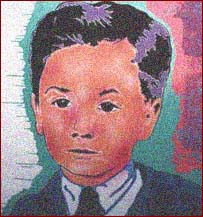 Eccentric almost from childhood, John Lennon seemed to sense he had a mission to accomplish, an almost superhuman goal to achieve. And as fate would have it, John did indeed experience the kind of fame that comes to few: those considered most exalted in the annals of history by virtue of their outstanding deeds and incredible accomplishments. But, of course, in his youth, he was as unknowing as the rest of the world just how his ambition and drive would play itself out. Of his early awareness of his genius, John said:
Eccentric almost from childhood, John Lennon seemed to sense he had a mission to accomplish, an almost superhuman goal to achieve. And as fate would have it, John did indeed experience the kind of fame that comes to few: those considered most exalted in the annals of history by virtue of their outstanding deeds and incredible accomplishments. But, of course, in his youth, he was as unknowing as the rest of the world just how his ambition and drive would play itself out. Of his early awareness of his genius, John said: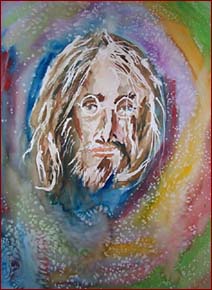 “People like me are aware of their so-called genius at ten, eight, nine. I always wondered: ‘Why has nobody discovered me?’ In school, didn’t they see that I’m cleverer than anybody in this school? That the teachers are stupid, too? That all they had was information that I didn’t need. I used to say to my auntie, ‘You throw my fuckin’ poetry out and you’ll regret it when I’m famous,’ and she threw the bastard stuff out. I never forgave her for not treating me like a fuckin’ genius or whatever I was, when I was a child. It was obvious to me. Why didn’t they put me in art school? Whey didn’t they train me? Why would they keep forcing me to be a fuckin’ cowboy like the rest of them? I was different, I was always different. Why didn’t anybody notice me? Later on, the fuckin’ fans tried to beat me into being a fuckin’ Beatle or an Engelbert Humperdinck, and the critics tried to beat me into being Paul McCartney.”
“People like me are aware of their so-called genius at ten, eight, nine. I always wondered: ‘Why has nobody discovered me?’ In school, didn’t they see that I’m cleverer than anybody in this school? That the teachers are stupid, too? That all they had was information that I didn’t need. I used to say to my auntie, ‘You throw my fuckin’ poetry out and you’ll regret it when I’m famous,’ and she threw the bastard stuff out. I never forgave her for not treating me like a fuckin’ genius or whatever I was, when I was a child. It was obvious to me. Why didn’t they put me in art school? Whey didn’t they train me? Why would they keep forcing me to be a fuckin’ cowboy like the rest of them? I was different, I was always different. Why didn’t anybody notice me? Later on, the fuckin’ fans tried to beat me into being a fuckin’ Beatle or an Engelbert Humperdinck, and the critics tried to beat me into being Paul McCartney.”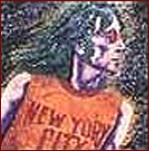 From becoming simply “John” to becoming a recluse was his next major step, which he took in 1975 after the birth of his son, Sean. Of his life in New York, John said:
From becoming simply “John” to becoming a recluse was his next major step, which he took in 1975 after the birth of his son, Sean. Of his life in New York, John said: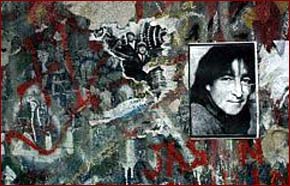 “You have to do it yourself. That’s what the great masters and mistresses have been saying ever since time began. They can point the way, leave signposts and little instructions in various books that are now called holy and worshipped for the cover of the book and not what it says; but the instructions are there for all to see, have always been and always will be. There’s nothing new under the sun. All the roads lead to Rome. And people cannot provide it for you. I can’t wake you up. You can wake you up. I can’t cure you. You can cure you.
“You have to do it yourself. That’s what the great masters and mistresses have been saying ever since time began. They can point the way, leave signposts and little instructions in various books that are now called holy and worshipped for the cover of the book and not what it says; but the instructions are there for all to see, have always been and always will be. There’s nothing new under the sun. All the roads lead to Rome. And people cannot provide it for you. I can’t wake you up. You can wake you up. I can’t cure you. You can cure you.